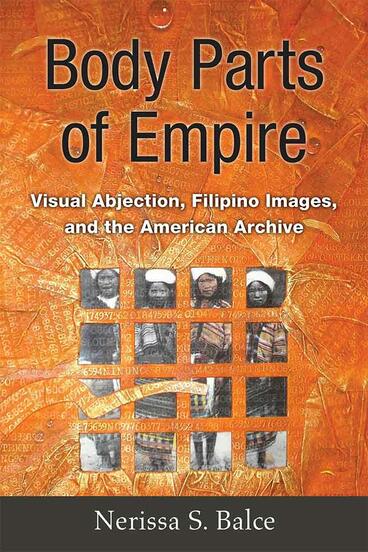Body Parts of Empire
Visual Abjection, Filipino Images, and the American Archive
A cross-disciplinary reading of American popular culture at a time of U.S. imperialism and the occupation of the Philippine Islands.
Description
Body Parts of Empire is a study of abjection in American visual culture and popular literature from the Philippine-American War (1899–1902). During this period, the American national territory expanded beyond its continental borders to islands in the Pacific and the Caribbean. Simultaneously, new technologies of vision emerged for imagining the human body, including the moving camera, stereoscopes, and more efficient print technologies for mass media.
Rather than focusing on canonical American authors who wrote at the time of U.S. imperialism, this book examines abject texts—images of naked savages, corpses, clothed native elites, and uniformed American soldiers—as well as bodies of writing that document the goodwill and violence of American expansion in the Philippine colony. Contributing to the fields of American studies, Asian American studies, and gender studies, the book analyzes the actual archive of the Philippine-American War and how the racialization and sexualization of the Filipino colonial native have always been part of the cultures of America and U.S. imperialism. By focusing on the Filipino native as an abject body of the American imperial imaginary, this study offers a historical materialist optic for reading the cultures of Filipino America.
Nerissa S. Balce is Associate Professor of Asian and Asian American studies at the State University of New York at Stony Brook.
Reviews
"Eloquently written and assiduously researched, Body Parts of Empire significantly remaps the course of U.S. Empire in its sophisticated attention on the violent iconography of twentieth-century militarized conquest. At stake in Balce’s important book is an urgent call to re-see America’s multi-decade occupation of the Philippines via its disastrous actualities and catastrophic aftermaths. Capacious and nuanced, Body Parts of Empire is a remarkable work."
--Cathy J. Schlund-Vials, Director, Asian and Asian American Studies Institute at the University of Connecticut
"By brilliantly dissecting the anatomy of an imperial archive with a scrupulous analytical eye and an elegant hand, Nerissa Balce offers a compelling set of critical ideas about the travails and trials of Philippine-U.S. relations in ways that trouble long-held historical interpretations and track new possibilities for apprehending the ruins of a postcolony. Body Parts of Empire brings together the methods and theories of visual studies, postcolonial studies, and cultural studies to produce a stunning intellectual foray into America's final frontier in Asia."
--Martin F. Manalansan IV, Head, Department of Asian American Studies, University of Illinois
"Nearly a quarter-century after the publication of Mary Pratt’s Imperial Eyes, Nerissa Balce disrupts and transforms the power/knowledge of the field of postcolonial studies. How? By achieving nothing less than the disruption and transformation of the power/knowledge of the field of vision itself."
--Sarita See, University of California Riverside
"Body Parts of Empire establishes Balce as an authority on visual and media representations of the Philippine-American War... With scholarship that is both cogent and unsettling, Balce makes the case for drawing two important meanings from the archived images of America’s first foray into foreign domination: that it was a violation of the Filipinos’ right to self-determination and sovereignty, and that it was a world-historical event that proved instrumental, for better and for worse, in the making of the American empire."
- MELUS
Winner: Association for Asian American Studies (AAAS) 2018 Best Book in Cultural Studies, Filipino Section
- AAAS Best Book in Cultural Studies
"Prompts us to ask about the global lineage of gendered and racial violence that subtended white supremacy and privilege from the nineteenth to the twentieth centuries, and how we might read their continuities (and disjunctures) then and now."
- Comparative Literature Studies
--Comparative Literature Studies
"Sees more clearly than what the literature in the field offers...Balce seizes the optic to shed light on the unseen. And what makes for a clear seeing is her cogent writing, unburdened by the jargonistic mishaps of many scholarly books, to deliver the message: forgetting is impossible."
- Philippine Studies
--Philippine Studies

